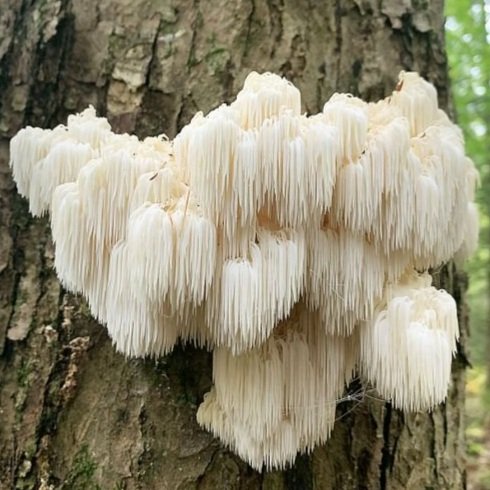What is Lion’s Mane?
Hericium erinaceus, commonly known as the Lion’s Mane mushroom, is a choice edible that belongs to the tooth fungus group. It’s native to North America, Europe, and Asia, and can be identified by it’s bright white color and it’s downward pointing teeth. The fruiting bodies can be harvested for culinary use. They are highly regarded as being a delicious addition to your meal.
Where and When to Harvest
These mushrooms are ready to harvest in late summer and autumn when temperatures start to cool down. If they get too hot they will dry out and start to turn pink faster. Once they mature and become pink and dry, their flavor will become unappetizing. Lion’s mane mushrooms are known to grow specifically on hardwood trees, usually where there has been an injury like broken limbs and insect damage. The fungi begins to fruit when temperatures are about 70 - 75°F and humidity is around 90 - 100%. When harvesting be sure to cut the mushroom with a sharp knife and avoid cutting the tree where the fruiting body connects to the tree. Leaving some behind will encourage a new crop of fruiting bodies to grow back the following year.
How to Consume
Lion’s mane is known to be very tasty with a flavor and texture that resembles crab or lobster. This mushroom can either be eaten cooked or dried and steeped into a tea. Make sure to cook well with high heat to avoid any adverse side effects. It’s medicinal properties can be utilized much more efficiently when used to make a double extracted tincture. It can also be taken as a tea or in a powdered form. Many reports claim that regular use is key to its effectiveness. I recommend taking Lion’s Mane supplements daily to help support overall brain and nerve health.
Get your Host Defense Lion’s Mane supplements here: https://amzn.to/3UL1RLP
Benefits of Lion’s Mane Mushroom
Enhances Brain Function and Memory
Lion’s mane mushroom is known to help treat a huge list of of ailments. Recent studies show a clear effectiveness in enhancing brain function and memory. These studies have shown positive results in treating dementia, Alzheimer’s, and multiple sclerosis. It is known for its ability to enhance memory, stimulate cognitive function, prevent and treat neurodegenerative diseases, and encourage regrowth and recovery of nerve function. It slows down and is said to even reverse cell degeneration in the brain, which is extremely beneficial in diseases like Alzheimer’s, dementia, Parkinson’s, multiple sclerosis, and diabetes, where nerve damage is a primary symptom of the disease. It also increases acetylcholine and choline acetyltransferase, which are severely depleted in Alzheimer’s patients and necessary for nerve cell communication.
Heals Nervous System
Lion's mane mushrooms can speed recovery to damage nervous system tissue in the brain and spinal cord and stimulate the repair of damaged nerve cells. Lion's mane has been shown to stimulate nerve growth factor NGF which is important in the repair of the myelin sheath.
Studies show great potential for myelination and regeneration of nerves.
Protects Against Cancer
Lion's mane has had good results in treating lung cancer stomach cancer esophageal cancer liver cancer leukemia cervical cancer stomach cancer skin cancer colon cancer and breast cancer.
It stimulates the immune system and helps kill off cancer cells controls tumor growth and prevents cancer from spreading to other parts of the body.
Support's a Health Heart and Circulation
It has been shown to lower LDL bad cholesterol and blood triglycerides improve fat metabolism and prevent blood clots reducing the risk of heart attack or stroke. It also increases blood oxygenation and circulation.
Improves Digestive Health, Ulcers, and Leaky Gut
Beneficial to the function of the digestive tract and aid leaky gut repair. It is used to treat gastric ulcers gastritis inflammatory bowel disease Crohn's disease and colitis. It's anti-inflammatory effects provide most of the benefits but the mushroom also soothes the gut and encourages a healthy gut environment. It also reduces intestinal bleeding and protects against H. pylori.
Reduces Inflammation
Powerful anti-inflammatory which is useful in the prevention of most chronic disease including heart disease diabetes autoimmune diseases and cancer.
Anxiety, Stress, Depression, and Mental Health Issues
Useful and improving a number of mental health issues including insomnia anxiety depression and slowing the progression of dementia. They help regenerate brain cells and improve brain function. Helps with stress and anxiety symptoms such as heart palpitations, irritation, and concentration.
Improves Gut Health
Helping the body fight infection from bacteria, viruses, yeast, and fungi.
Diabetes and Neuropathy
Variety of effects that are beneficial to diabetics. With consistent use it lowers blood glucose levels and improves insulin sensitivity in type 2 diabetes. In lowering blood sugar levels it helps prevent complications from kidney disease, eye damage, and nerve damage in the hands and feet. It also helps relieve the pain of diabetic neuropathy.
Strokes, Concussions, and Brain Injuries
Due to its neuroprotective effects it can help the nervous system deal with the lack of oxygen, blood clots, memory issues, and more. Using it post-concussion makes sense since it is such an excellent healer for the brain and is a powerful anti-inflammatory.
Increases Energy
They reduce lactic acid buildup in the blood, increase blood oxygen levels and reduce muscle fatigue. They also increase glycogen in tissues, providing a source of ready and sustainable energy for the body.



